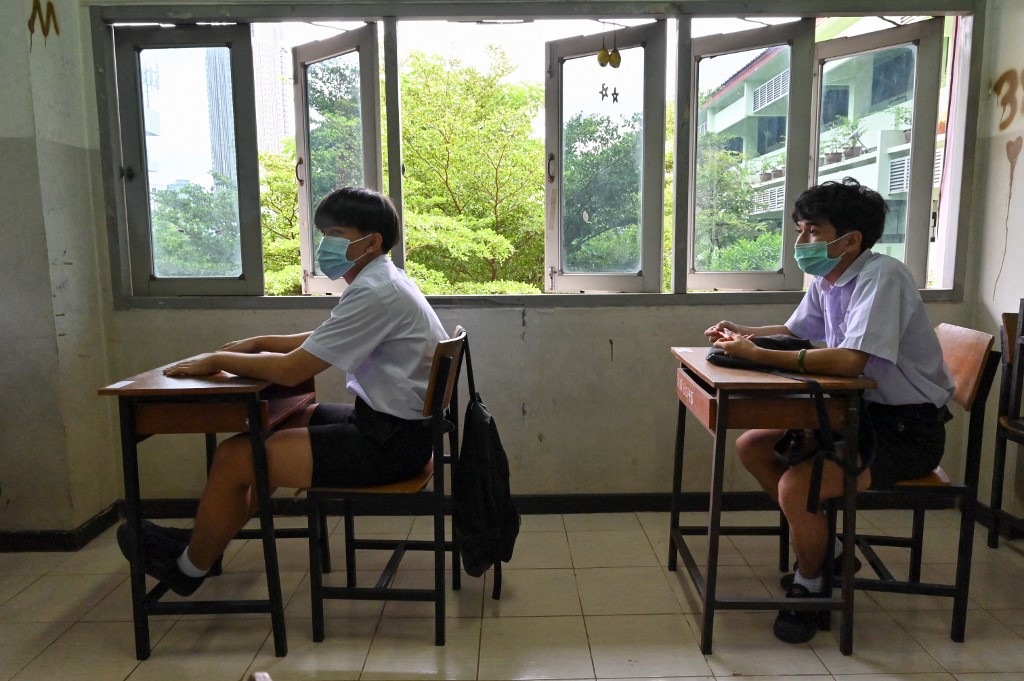During her two years as a teacher in Bangkok, Achala taught English to primary school students of a wide range of abilities. While some students struggled with English, others were quite advanced. Still, even highly talented students had trouble with English grammar structure.
Achala, not her real name, grew up in the UK but has Thai family. The duality made her well familiar with the ways many Thais speak English, so when she moved to Thailand as a teacher in 2018, she had an edge in understanding what many of her students were trying to say as they formed sentences.
“The way that the Thai language works is very different to English,” Achala said. “It is hard to teach English effectively to Thai students unless you really understand the structure of Thai language.”
But Thais’ struggles with the English language go beyond just Achala’s classroom. Despite ranking fourth highest regionally in the Human Development Index, the kingdom has among ASEAN’s worst test scores in the English Proficiency Index – comfortably below the likes of Cambodia and Vietnam, and only outscoring Myanmar in 2020 as it ranked seven of eight countries, excluding Laos and Brunei. Thailand’s average score on the index fell in the “very low” ranking, with total performance languishing at 89 out of 100 countries surveyed – a drop of 15 places on the year prior, below the likes of Uzbekistan, and 20 of 24 Asian countries.
While concrete answers for these foreign language struggles are hard to come by, experts and education reformers speculate the kingdom’s struggles with English are due to cultural factors and structural issues in the education system as a whole. The consequences of this are clear, with problems in English proficiency, observers say, now impacting the ability of Thais to study abroad, work in tourism and participate in the global community.
Popular English teacher Kanatip Soonthornrak, commonly known in Thailand as Loukgolf, is known for his ability to make Thai people feel comfortable speaking the language. Originally from a village in Southern Thailand, Loukgolf was unable to speak English until he was 15 years old. Today, he has a highly popular Youtube show called Loukgolf’s English Room on which he invites Thai celebrities to practice speaking English, as well as one million followers on Twitter.
Loukgolf is not your average English teacher. Sitting in his unorthodox classroom of Union Jack pillows and anthropomorphic animal portraits, he wears a black Landmee’ pullover and loose-fitting jeans, his gold-rimmed glasses adding an intellectual flourish to his trendy look. Despite his calm demeanour, his passion for English language education is evident – even as he despaired over the state of it in Thailand.

Loukgolf emphasised that many Thai students were missing opportunities to study at elite universities around the world.
“There are lots of people who say something like, ‘I can’t go abroad because I need to take I.E.L.T.S [International English Language Test]. I just can’t pass it’. You keep hearing this kind of thing,” he told the Globe.
A hindrance to Thailand’s economic development as a whole, a 2018 study of Thai companies found that 88% emphasised the importance of English for Thailand’s integration into the ASEAN economic community.
“Thailand will not thrive if Thai people stop learning English. In order to thrive on an international level, we need to encourage more Thais to learn English,” Loukgolf said. “We’ll be able to take care of tourists, we’ll be able to talk to them, and we’ll be able to do more business with people.”
Loukgolf understands the difficulty of learning English in an environment in which, he said, students commonly mock one another for practicing the language. Many guests on Loukgolf’s English Room have said that they were bullied growing up due to their struggles with English speaking.
“People make fun of others all the time. It’s part of being human. We make fun of people. It’s sad but it’s true,” Loukgolf said. “When we hear something strange, something we don’t understand, we might try to have fun with it.”
In May last year, one English teacher who taught Thai students online went viral and her schools closed after a video emerged of her speaking English with a strong Thai accent – a reflection of the shaming many Thais encounter when learning.
“It’s your job as an English teacher to educate your students that it’s not okay to make fun of people who are trying to speak English properly and naturally,” Loukgolf said. “Just because something sounds different, it doesn’t mean that it’s wrong”.
The Covid-19 pandemic has widened Thailand’s educational inequality, with schools with lower funding having less access to e-learning than better funded ones due to a lack of video-conferencing software. For students whose only exposure to English is through a teacher, this will cause problems in their ability to study the language.
Loukgolf said that wealthy children who have access to quality English education will continue to receive opportunities that poor children do not.
“I think it’s sad but it’s true; only a bunch of fortunate kids in this country are learning English properly, and happily, and beautifully,” he said. “They’re going to have more opportunities, and that’s not good. All the Thai students out there should have this privilege.”
I’d like to emphasise that this year, or maybe the next few years, will be all about surviving, not thriving. It’s very difficult to motivate people this year
Loukgolf also emphasised the impact of the pandemic on Thailand’s dropping English language proficiency, as the country slipped down the rankings last year.
“I’d like to emphasise that this year, or maybe the next few years, will be all about surviving, not thriving. It’s very difficult to motivate people this year,” he said.
Within the backdrop of the larger democratic protest movement, last year also saw challenges to Thailand’s firmly hierarchical education system, as students began demanding more dialogue and freedom of expression in their classrooms. One group, Bad Student, even began challenging military-inspired rules over dress codes and haircuts.
While not unique to the kingdom, Loukgolf highlighted this fixation with obedience and rote memorisation – in which teachers instruct and students listen – as a source of low language take-up among Thais. Loukgolf said schools and teachers need to make English enjoyable for students to learn, rather than narrowly focusing on grammar.
“Most Thai teachers will only speak Thai in class. And it’s all about grammar, reading, and writing. You’re hardly encouraged to express yourself in English, or even in Thai. You’re hardly encouraged to speak,” he said.
Achala agreed that Thai schools should teach English in a more engaging way, while not totally abandoning structure.
“There needs to be a mixture of structure and freedom. By that I mean it is too boring to follow a textbook to learn grammar and sentence structure all the time, a lot of that isn’t useful,” she said. “However, it is also unwise to have no structure or assessment and just let the children totally direct learning through their interests.”

But Thailand’s problem isn’t just one of English teaching, with structural deficiencies apparent across its education system. In December, the World Bank highlighted that Thailand spends less than a third of the OECD average per student between grades 1-9, while “Thailand’s performance is lower than expected” even compared to other countries with the same level of spending.
Kunthida Rungruengkiat, a member of Thailand’s progressive Move Forward Party, said that poor implementation of school materials in Thailand generally impacts students’ abilities to also learn second languages, such as English.
“First language instruction is also considered [low] in quality. If you are not strong in your first language, it becomes difficult to attain better results in the second language,” Kunthida said.
Kunthida, a well known education reform advocate, continued that Thailand’s low English proficiency is partly a result of the way in which Thai schools implement the country’s main national examinations, the multiple-choice Ordinary National Educational Test (O-NET). She said that students take the O-NET three times with three-year gaps in between in grades six, nine and 12, instead of in consecutive years. She said it is therefore ineffective in measuring if individual students are progressing from their previous score each year.
“They never really compare the progress of students, because O-NET is not taken every year. It’s in grades 6, 9, and 12,” she said. “The O-NET can exist, but a better way is to really measure thinking skills or other skills except memorisation – the whole exam has to be reformed.”

Kunthida also highlighted teachers and assessors not being properly trained when changes are made in school textbooks and curriculum – like the spelling of certain words, reading comprehension questions, and transitioning to written exams from multiple choice. Last year, she continued, Thailand’s then-Minister of Education Nataphol Teepsuwan put the most recently updated school curriculum on hold.
“We never know why [they do these things],” she said. “Every single process of assessment in examination-making in Thailand leads to failure. Because they never care about the process.”
Like Loukgolf, Kunthida said the fear of being mocked by peers prevents Thai students from practicing spoken English. At the same time, Kunthida said students who show effort are often labelled gradet – a Thai word implying that one tries too hard and thinks themselves superior.
Both Loukgolf and Kunthida pointed out part of the problem is that many Thais think of English as a method of identifying social class. Even Thai students who speak good English, Kunthida said, will sometimes adjust their accent to fit the accent of their teacher.
“In order to solve this problem, all of us, rich people, poor people, whatever people, have to just think of English as a tool to help us communicate,” Loukgolf said. “English is not to be seen as a form of superiority or inferiority.”


